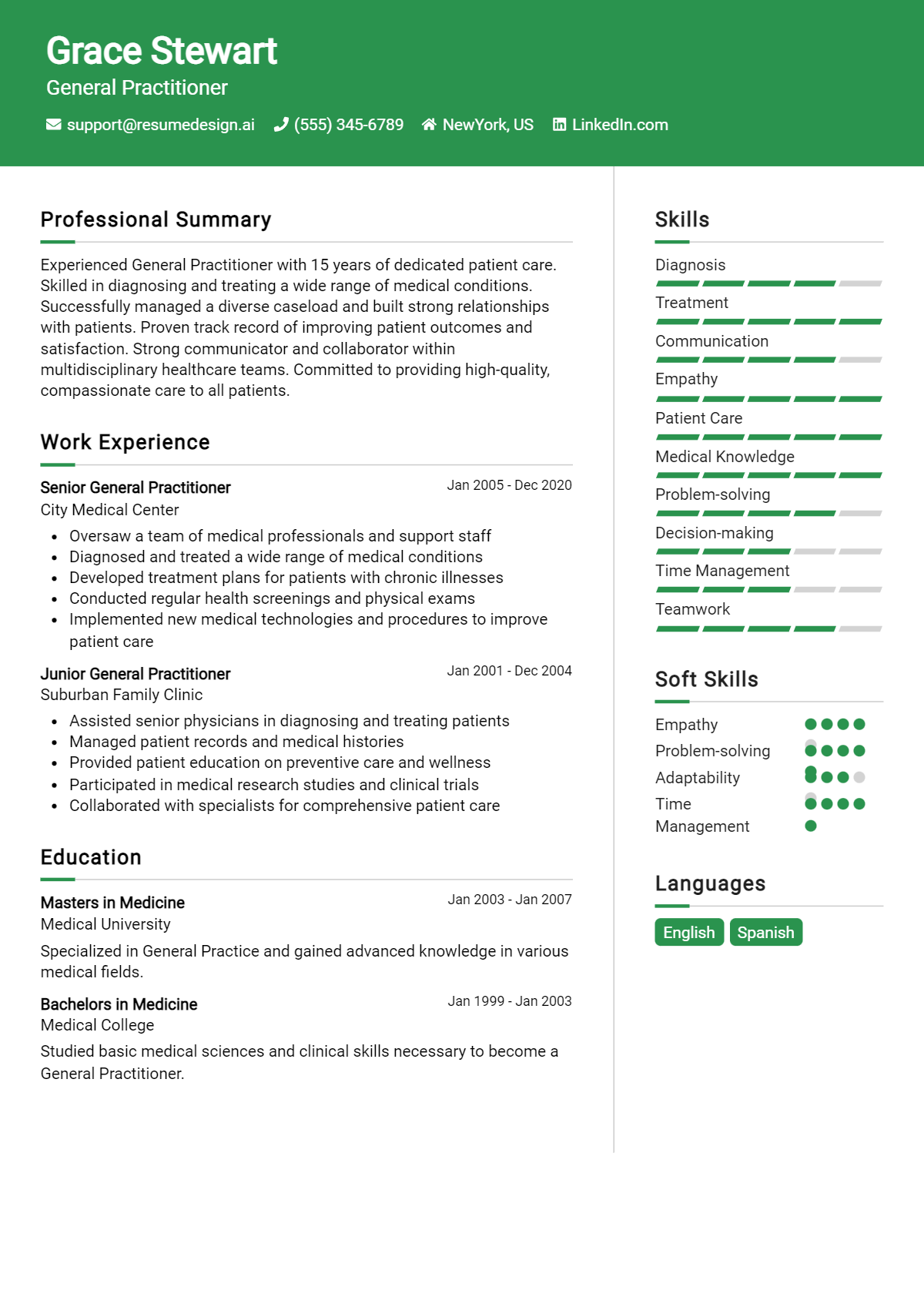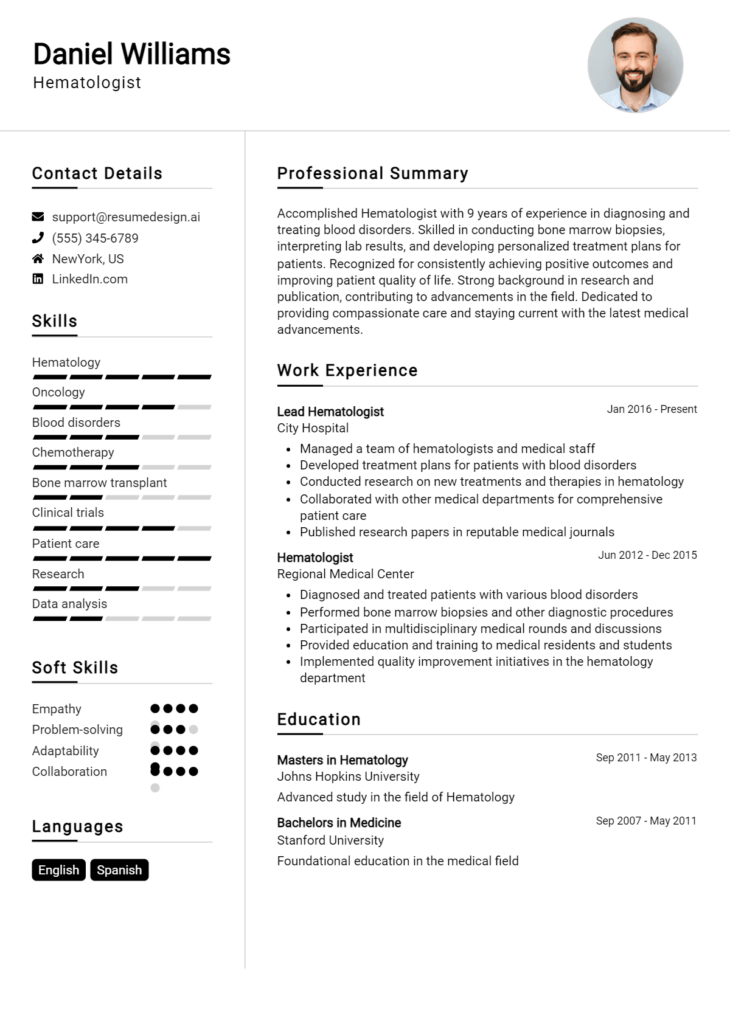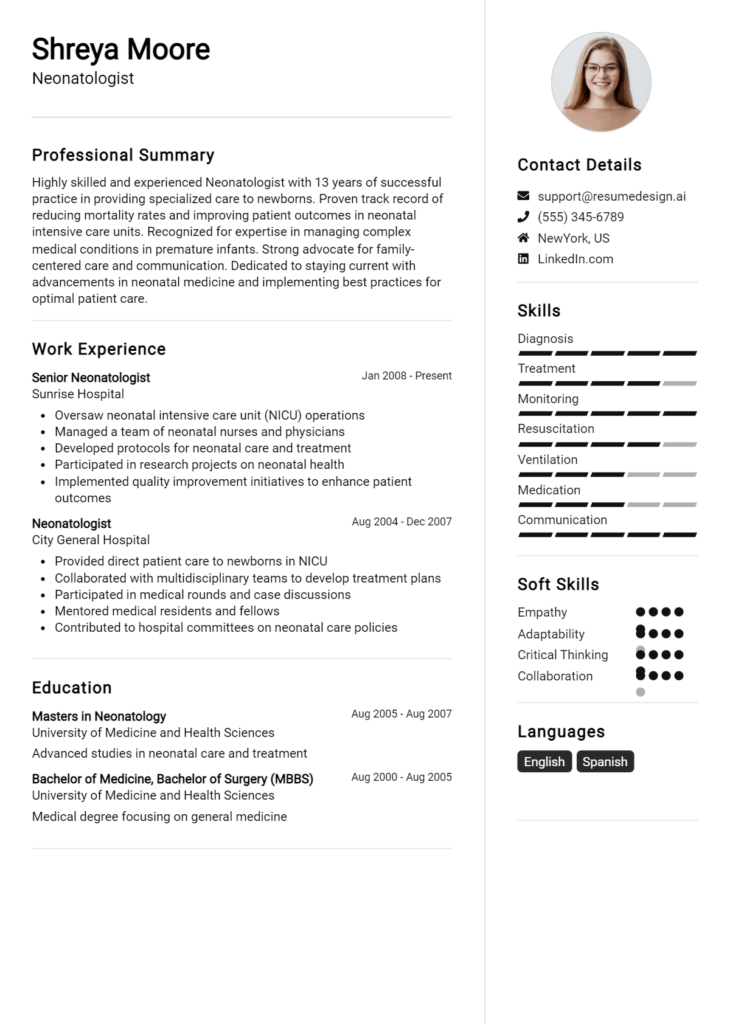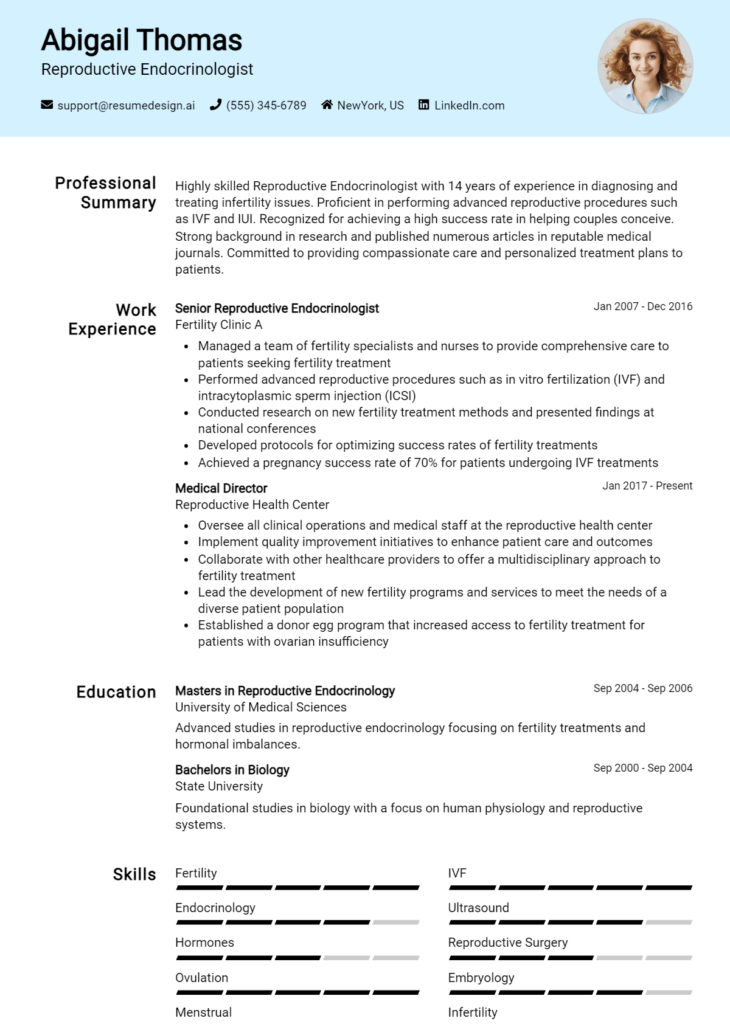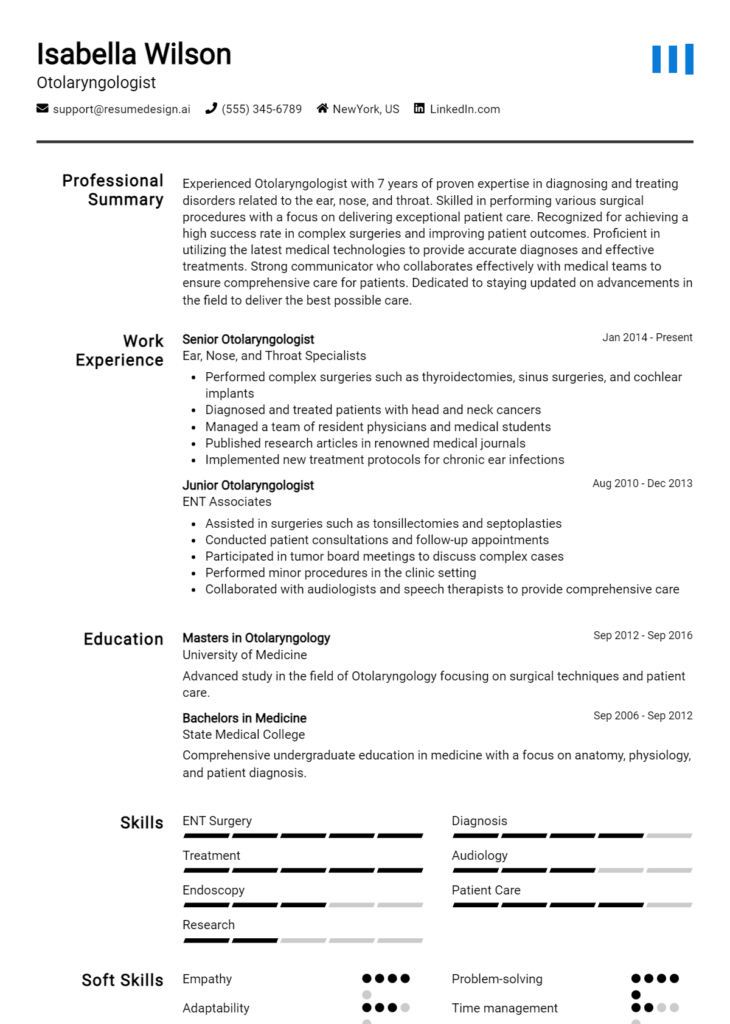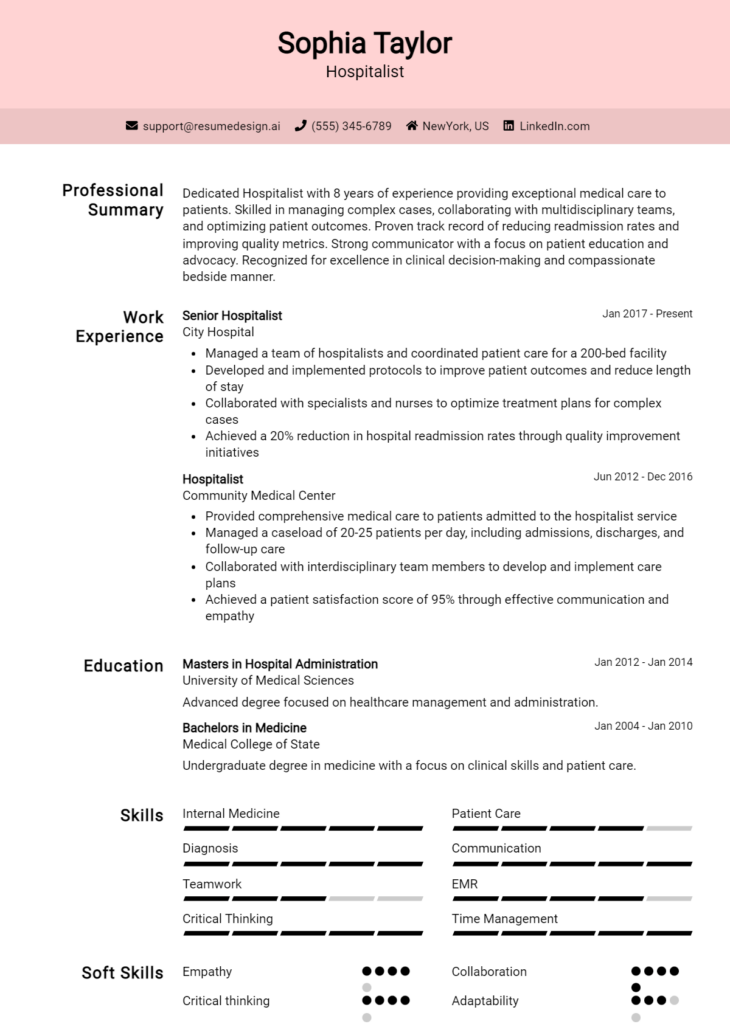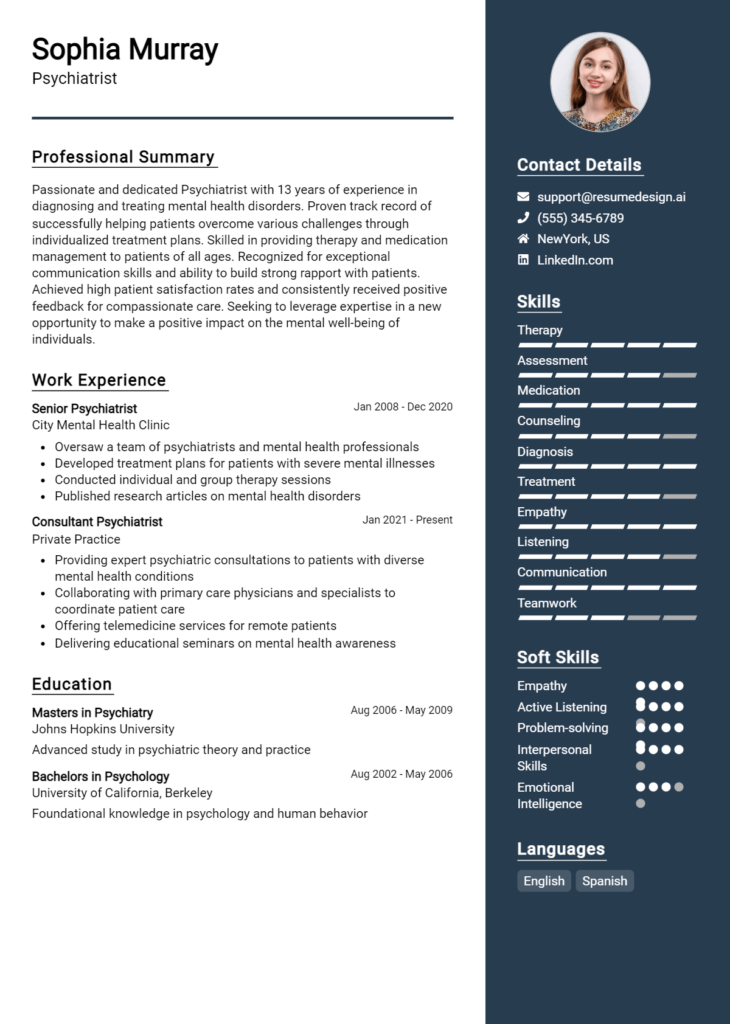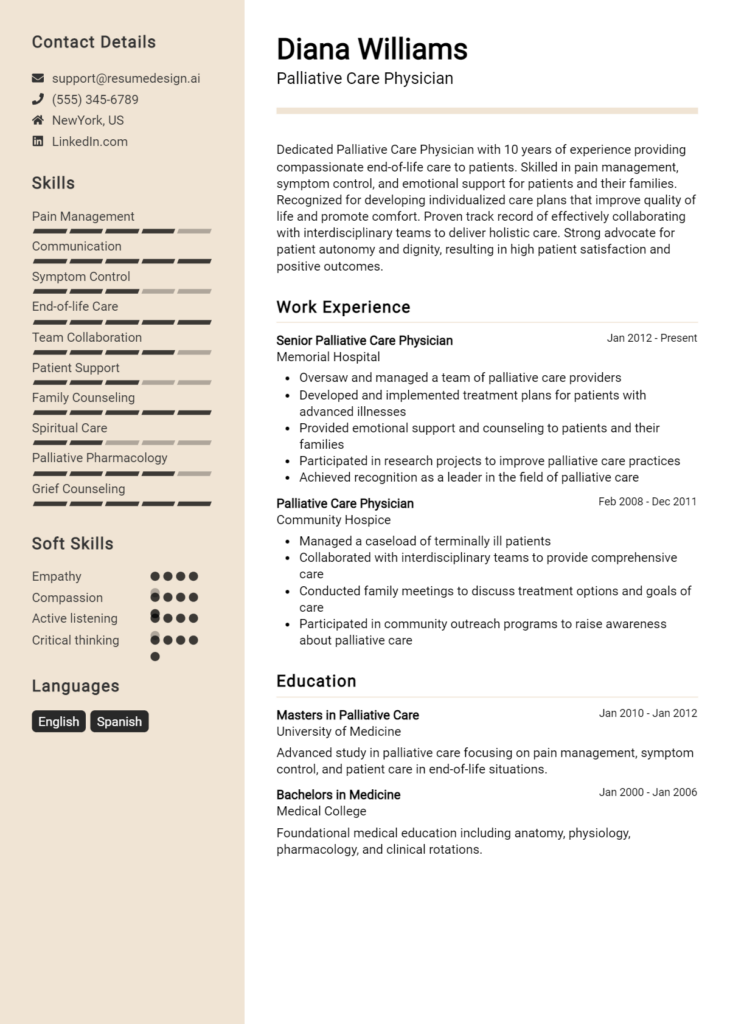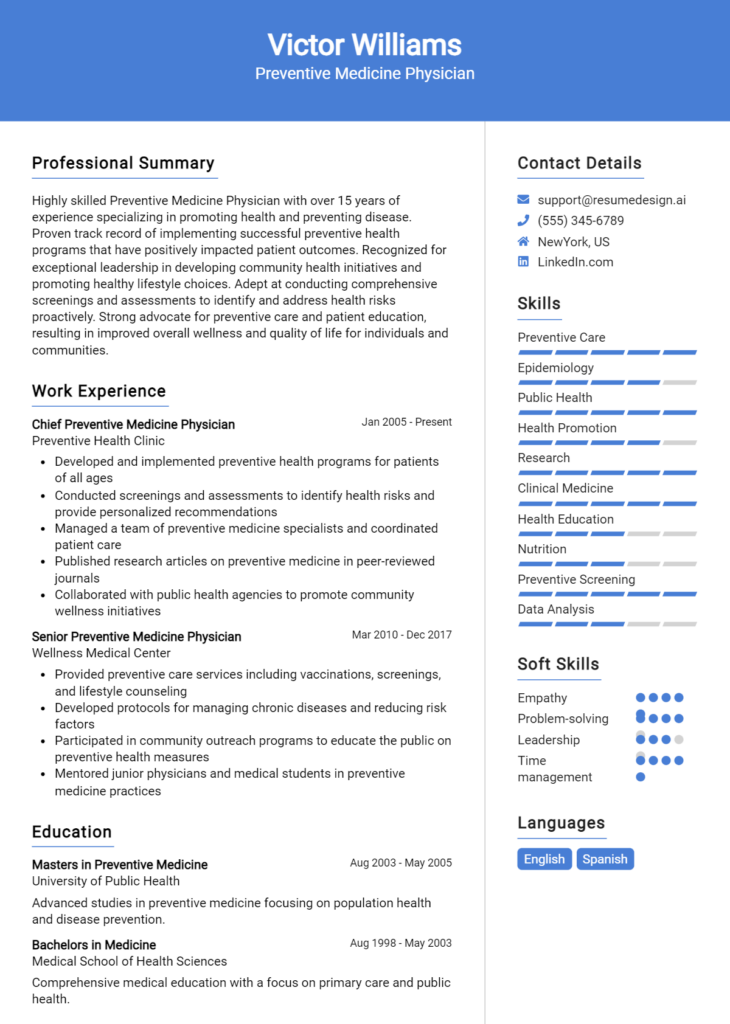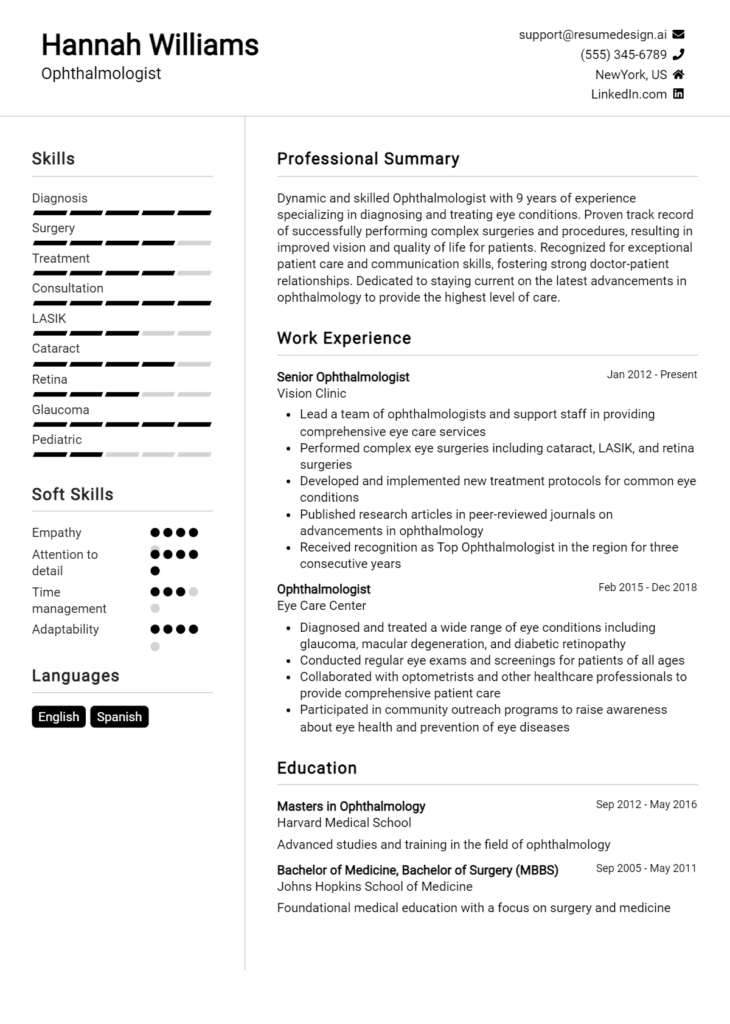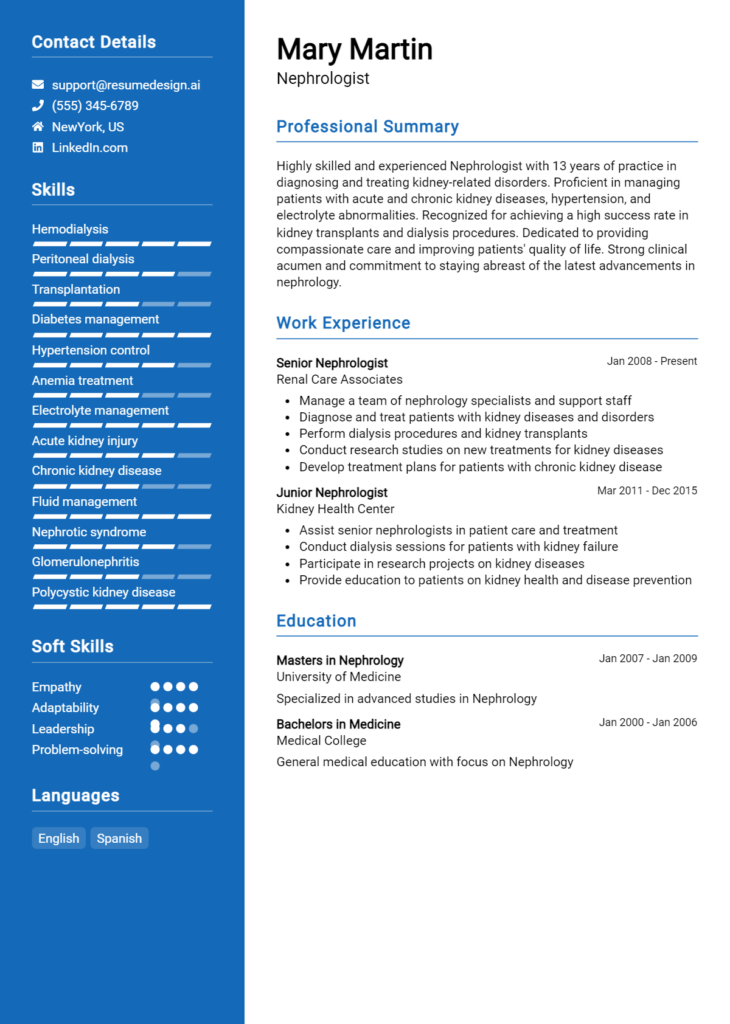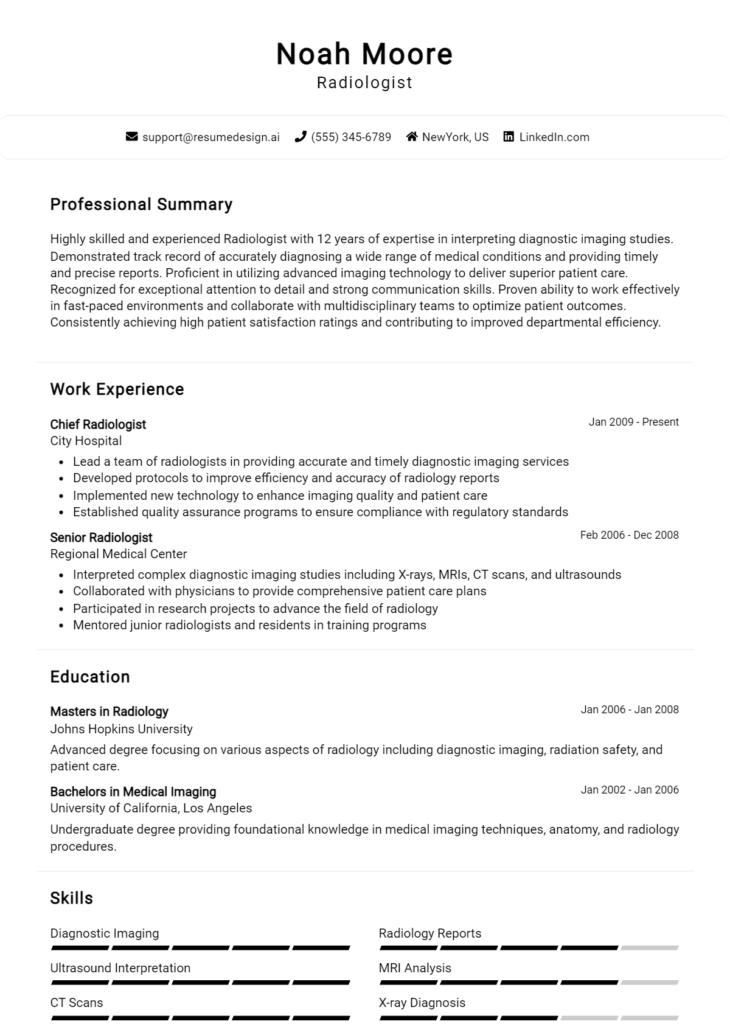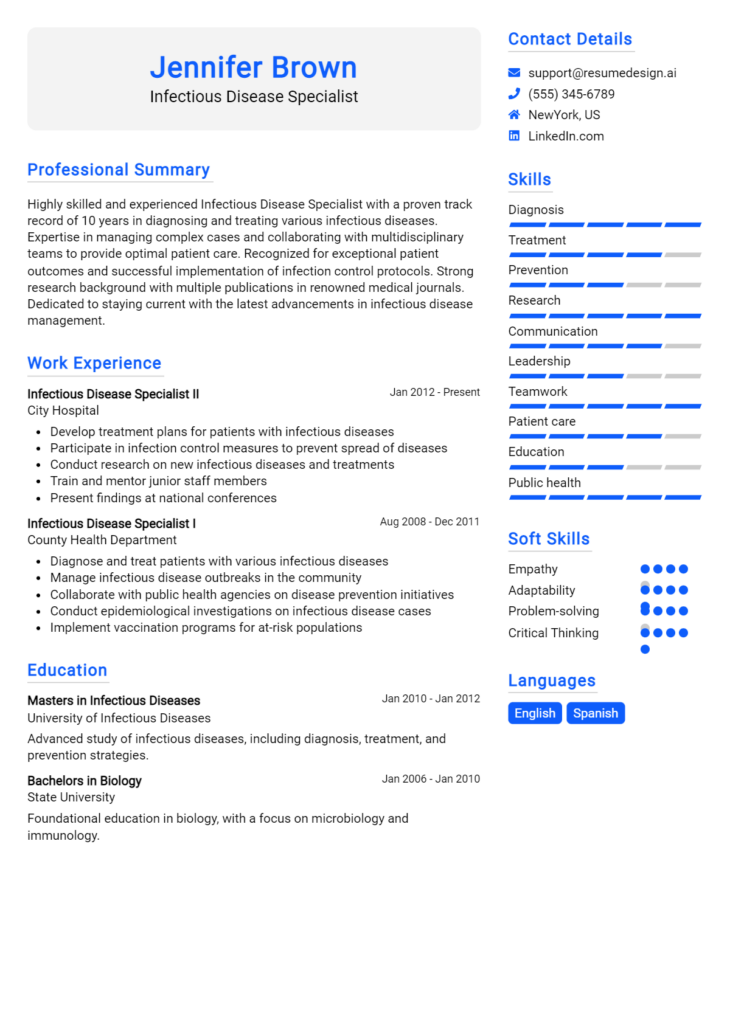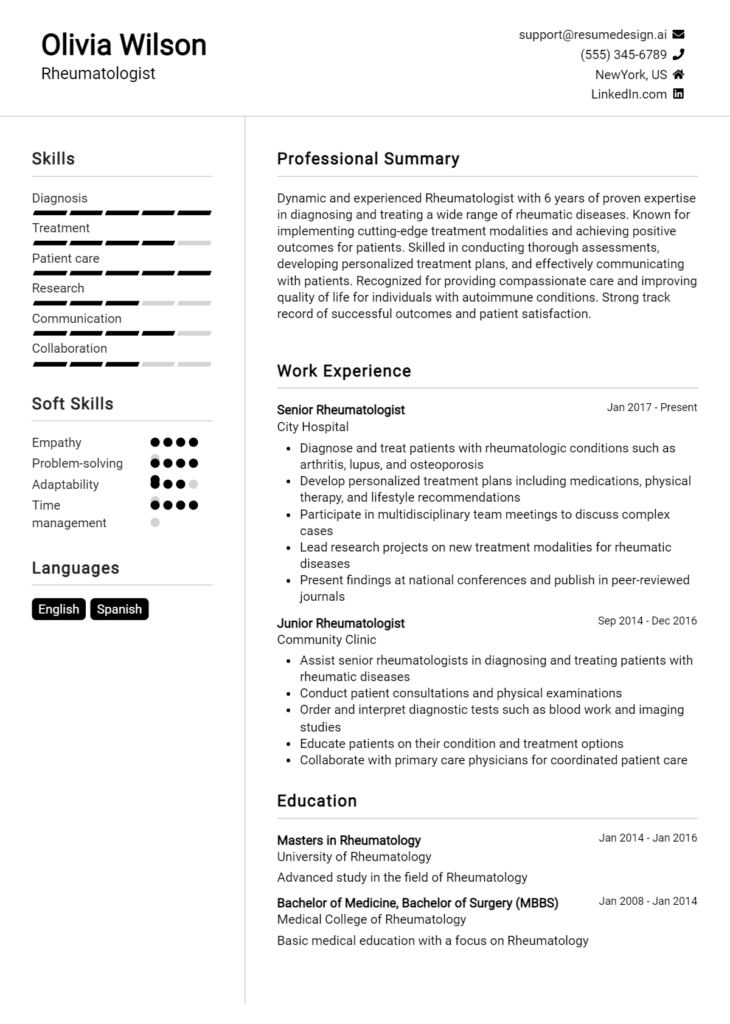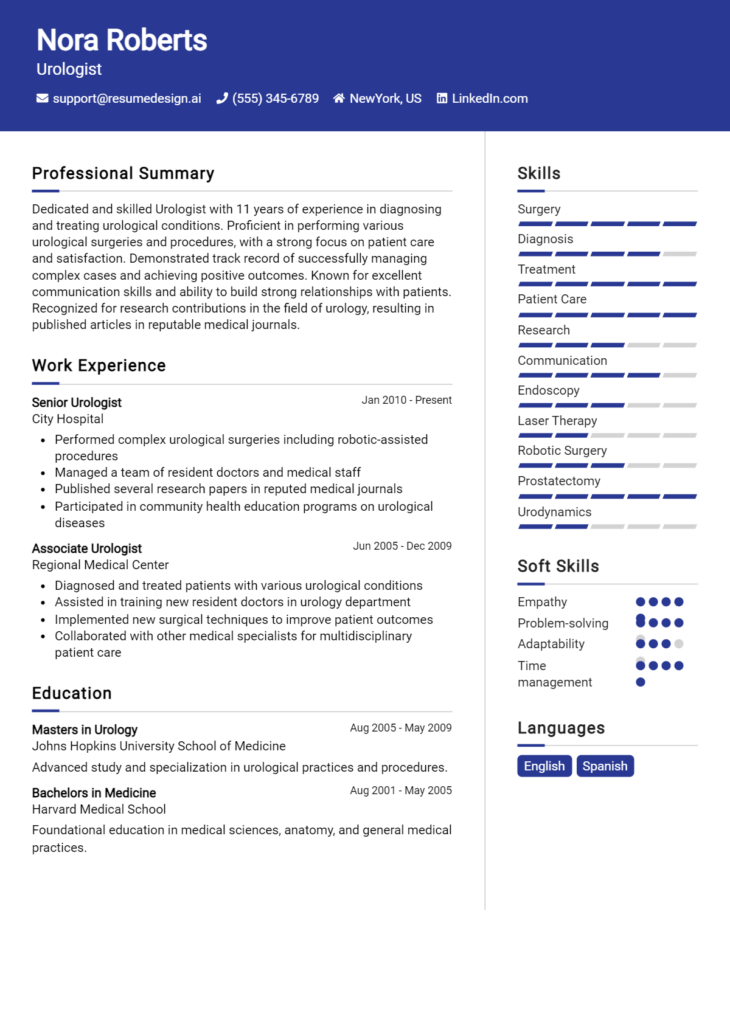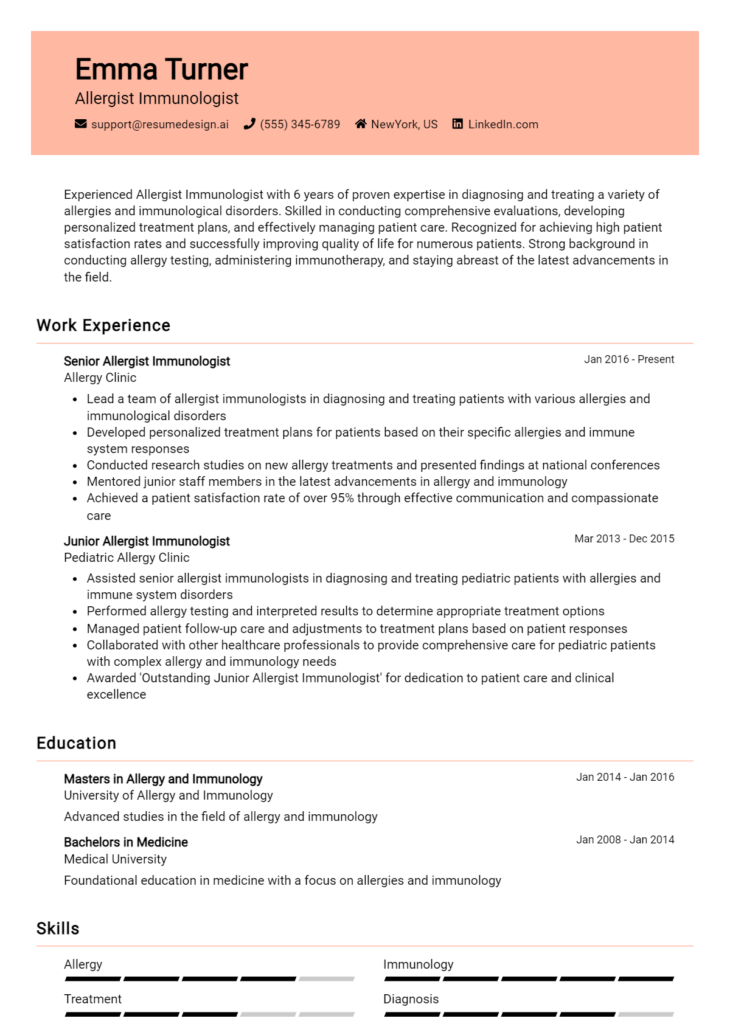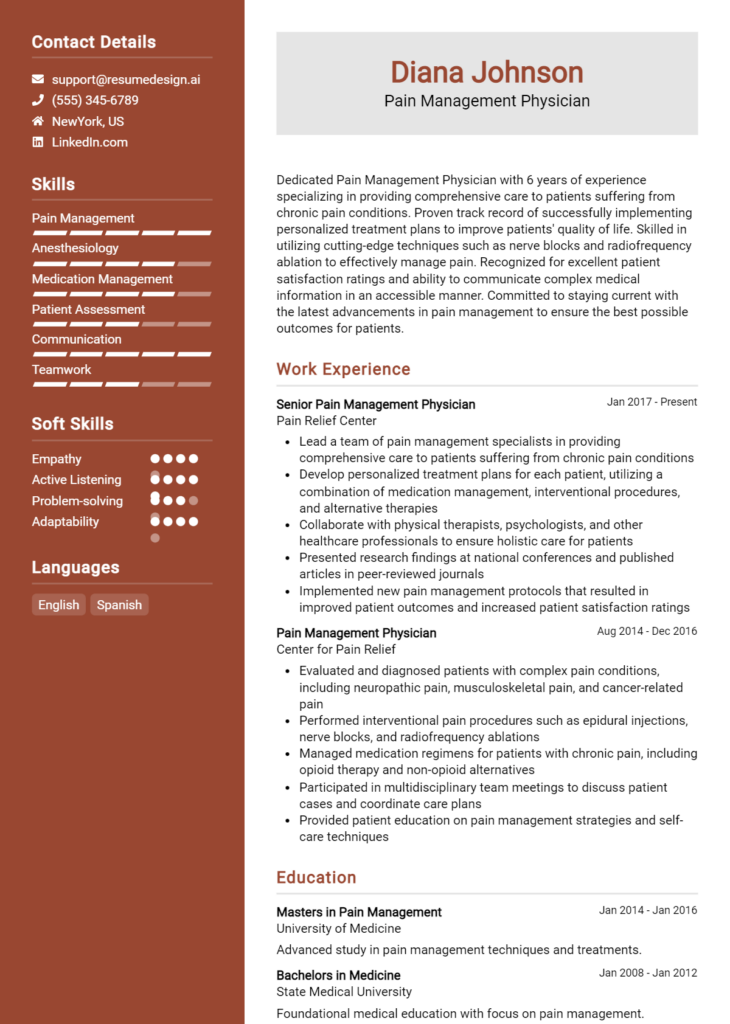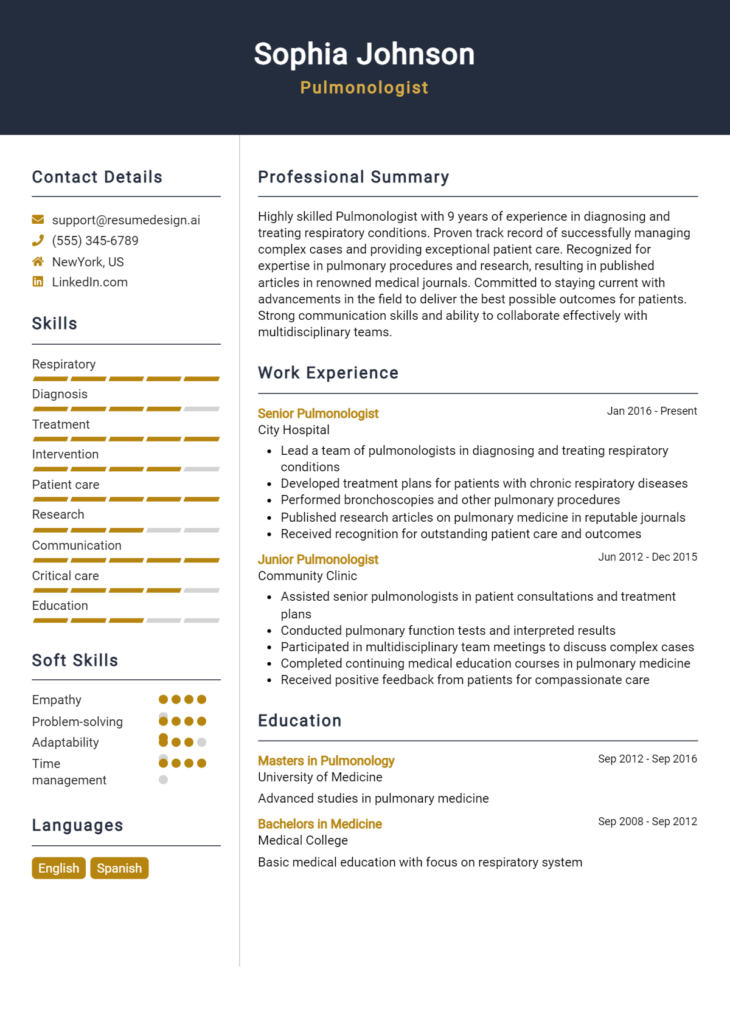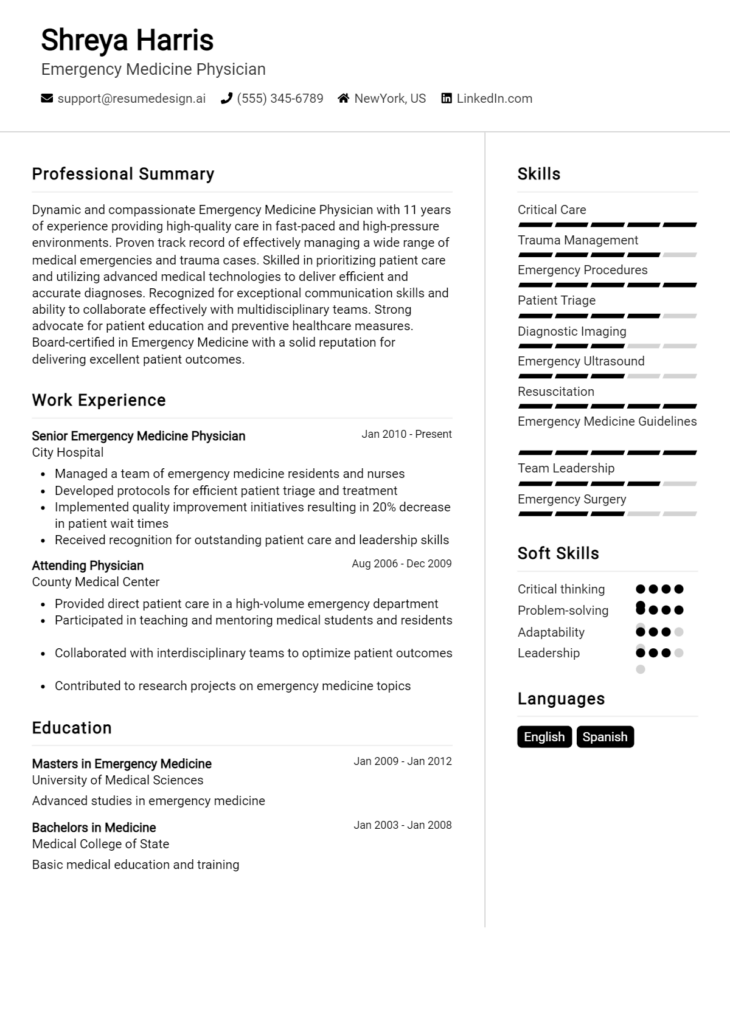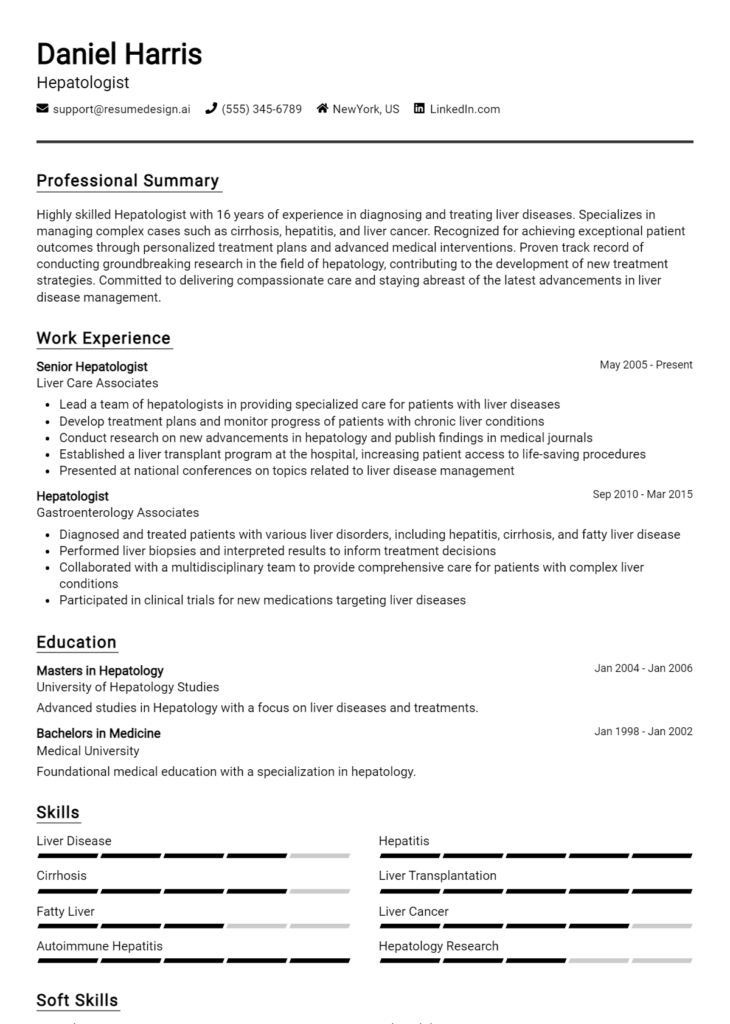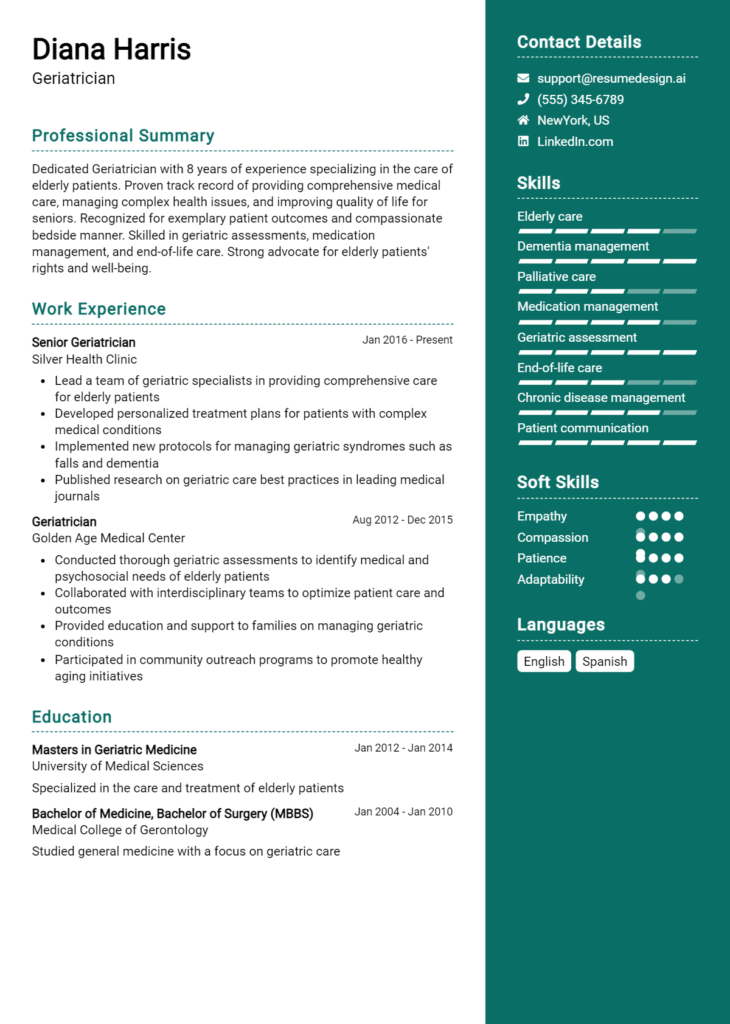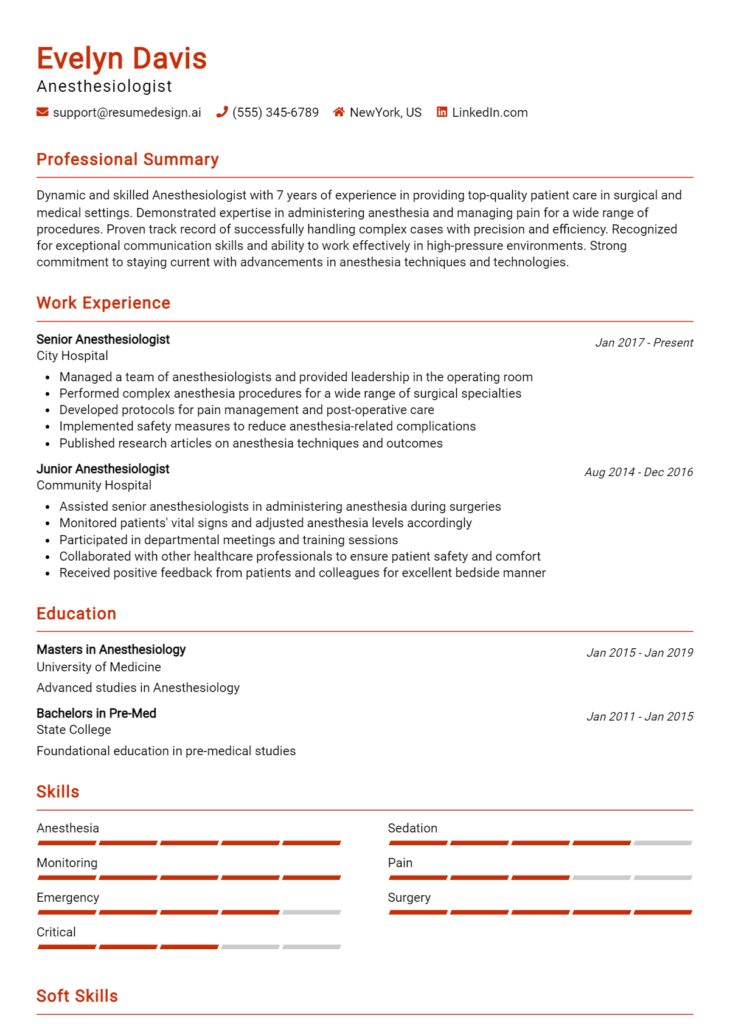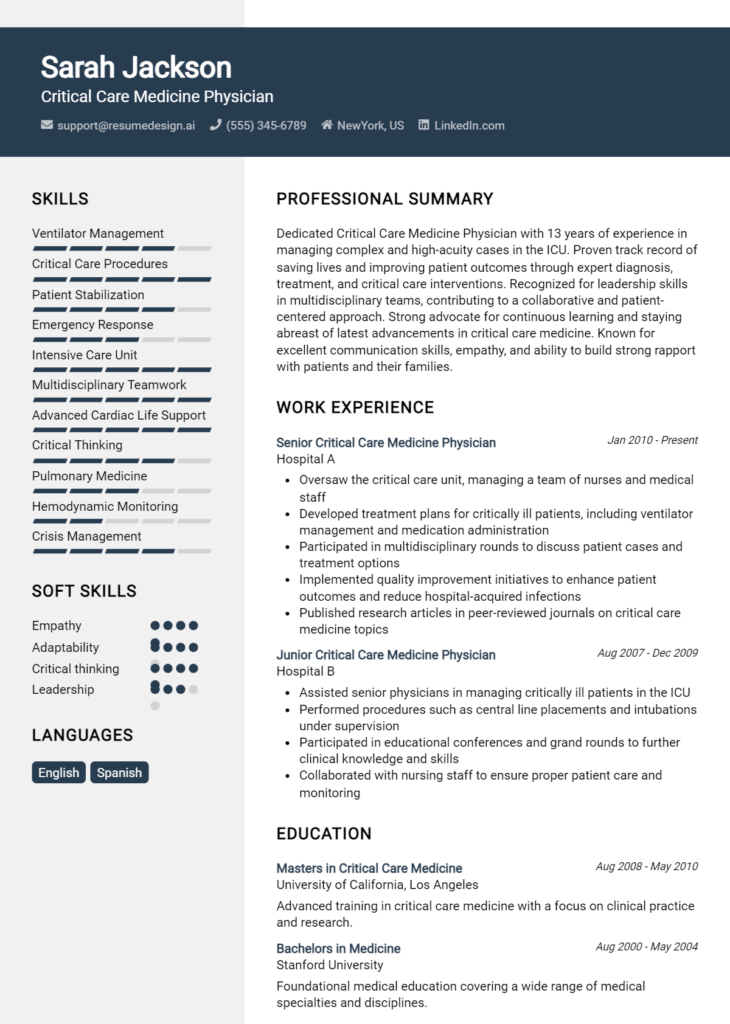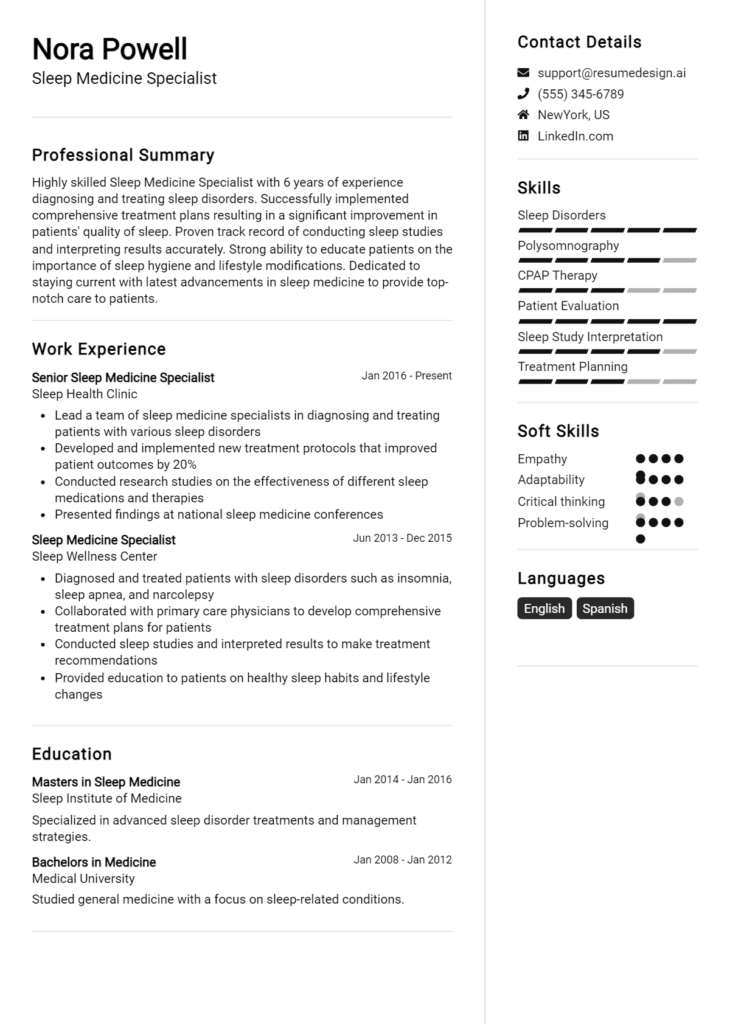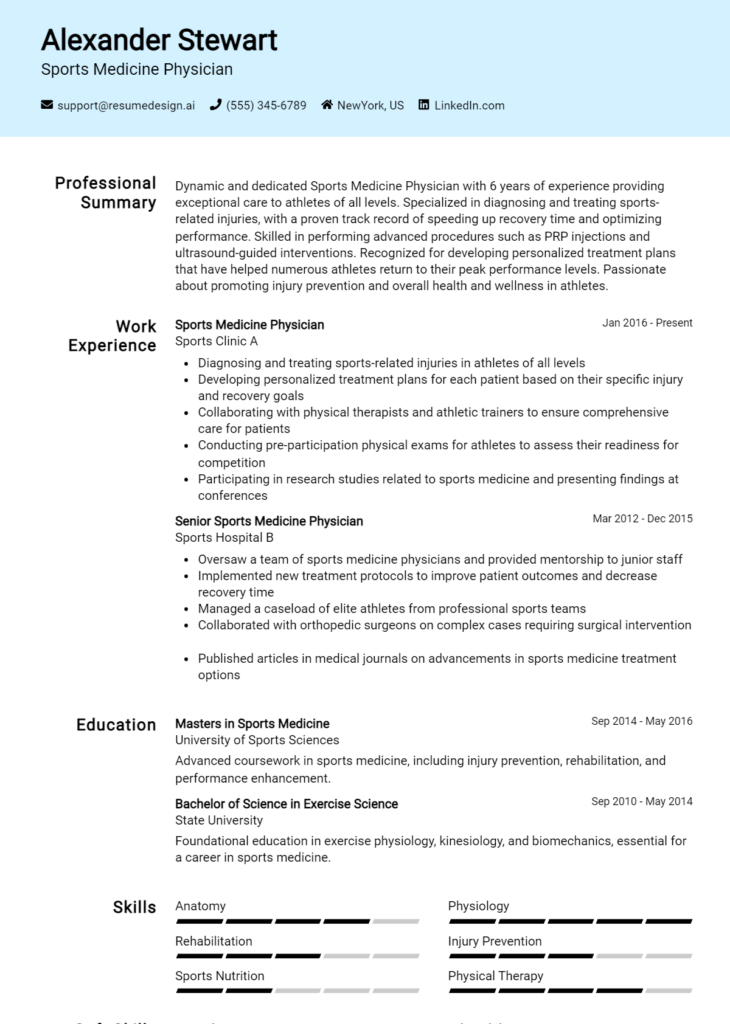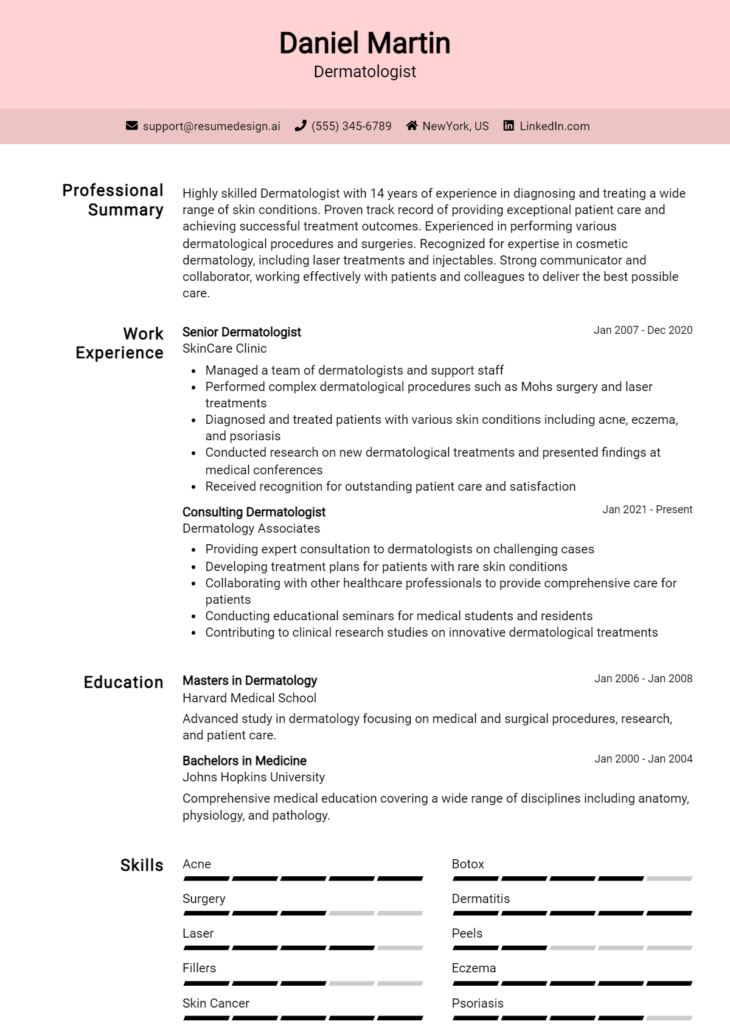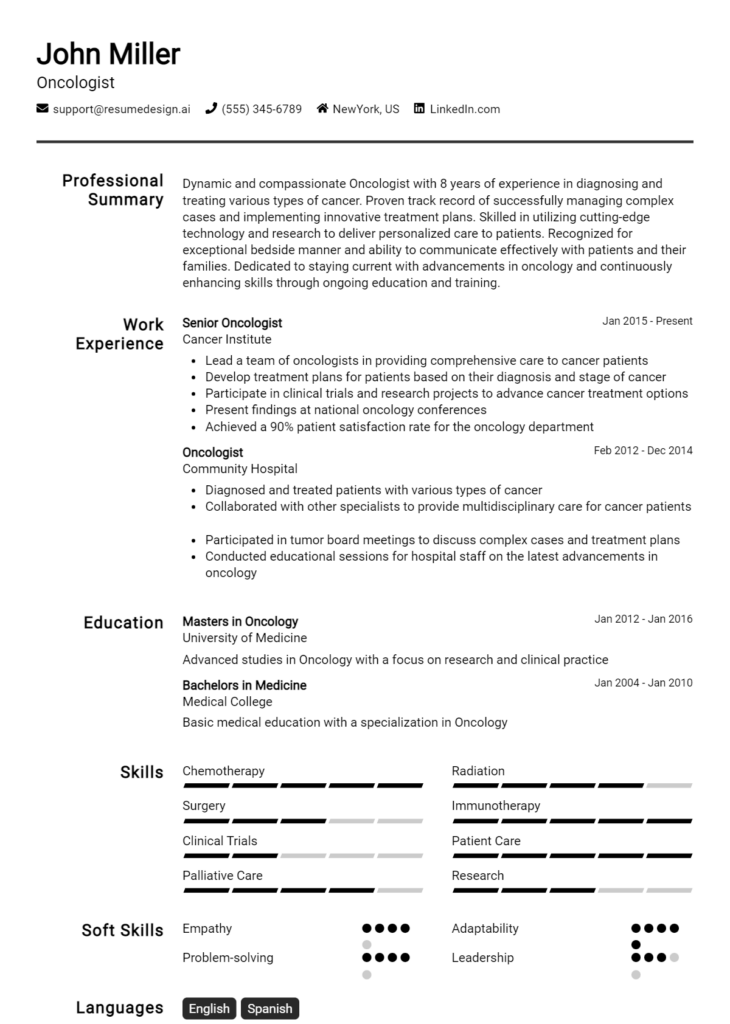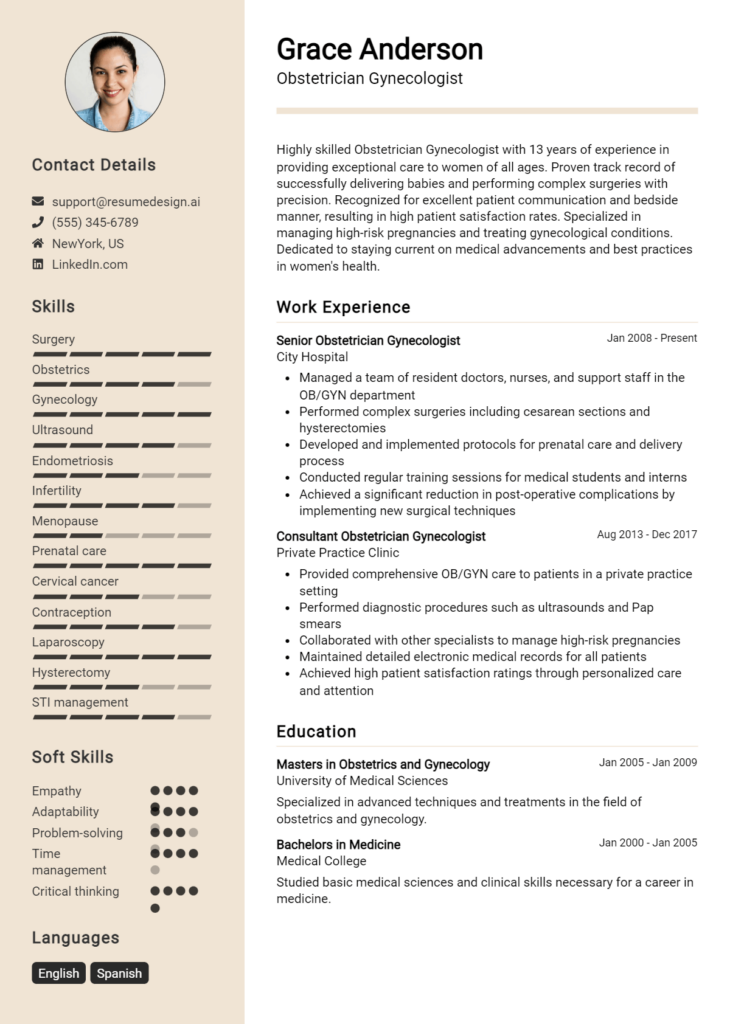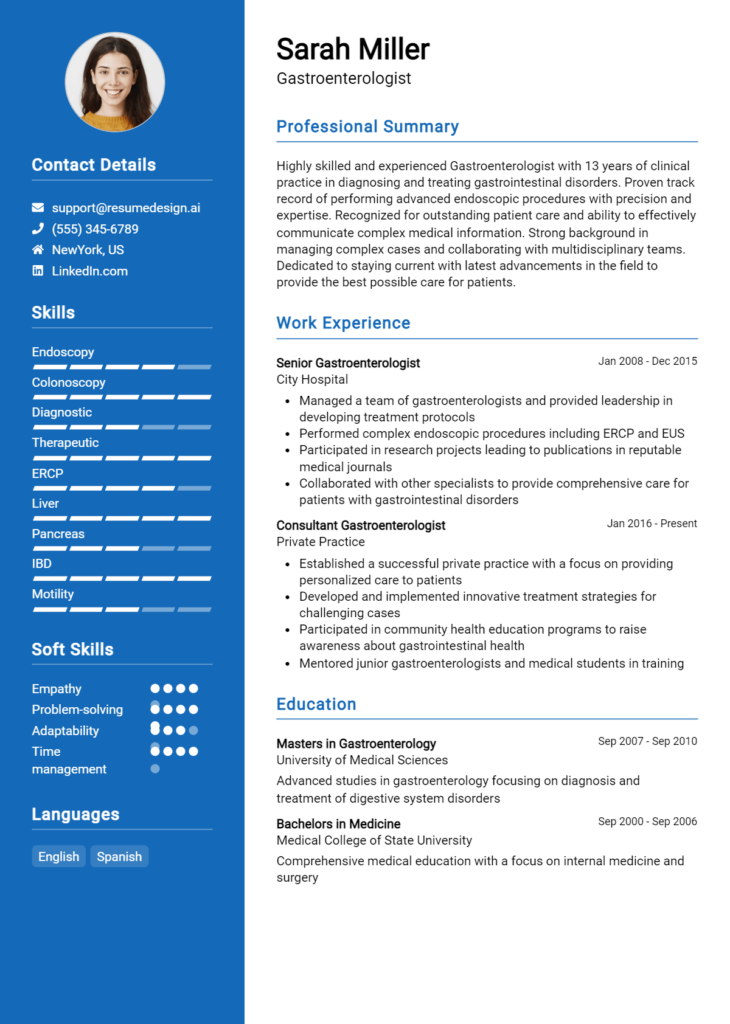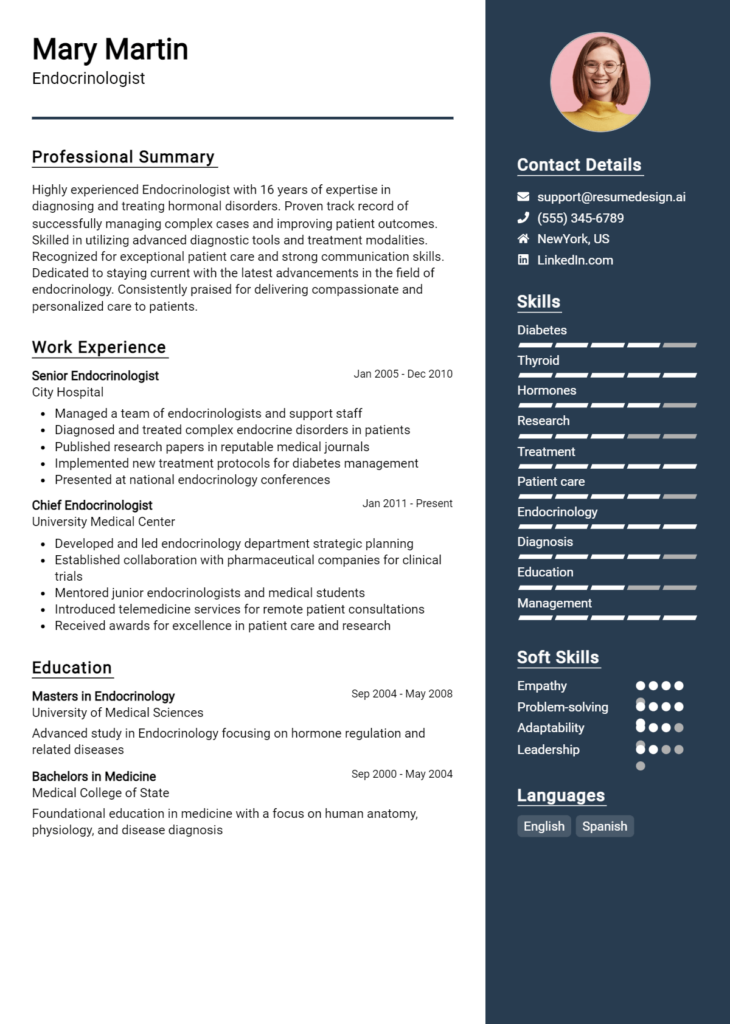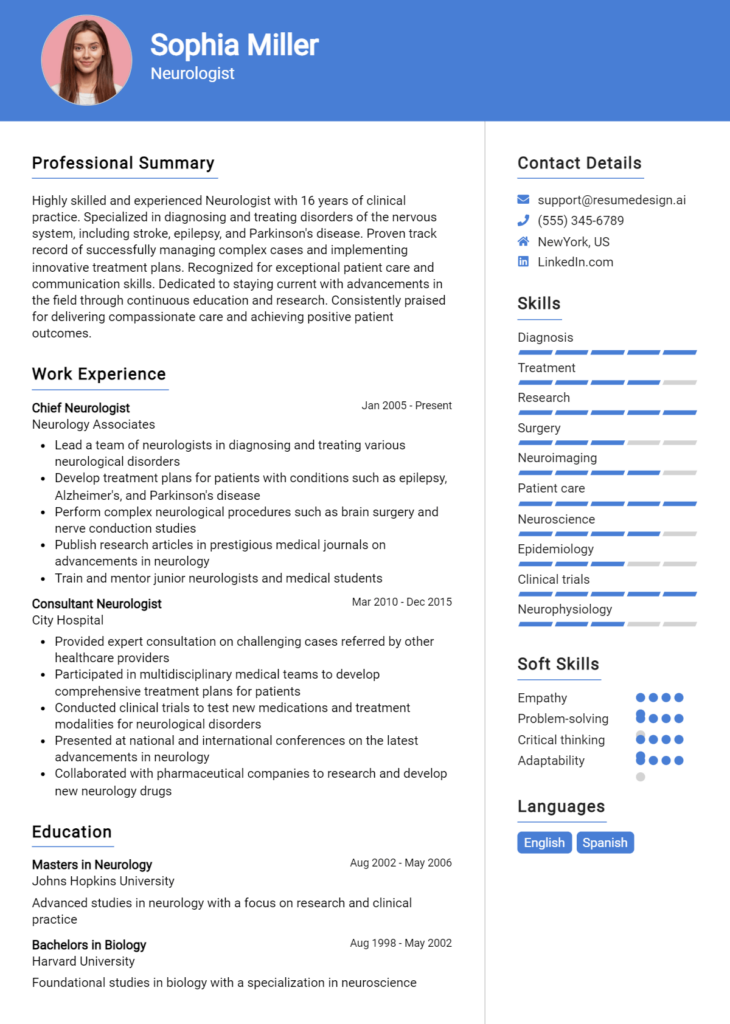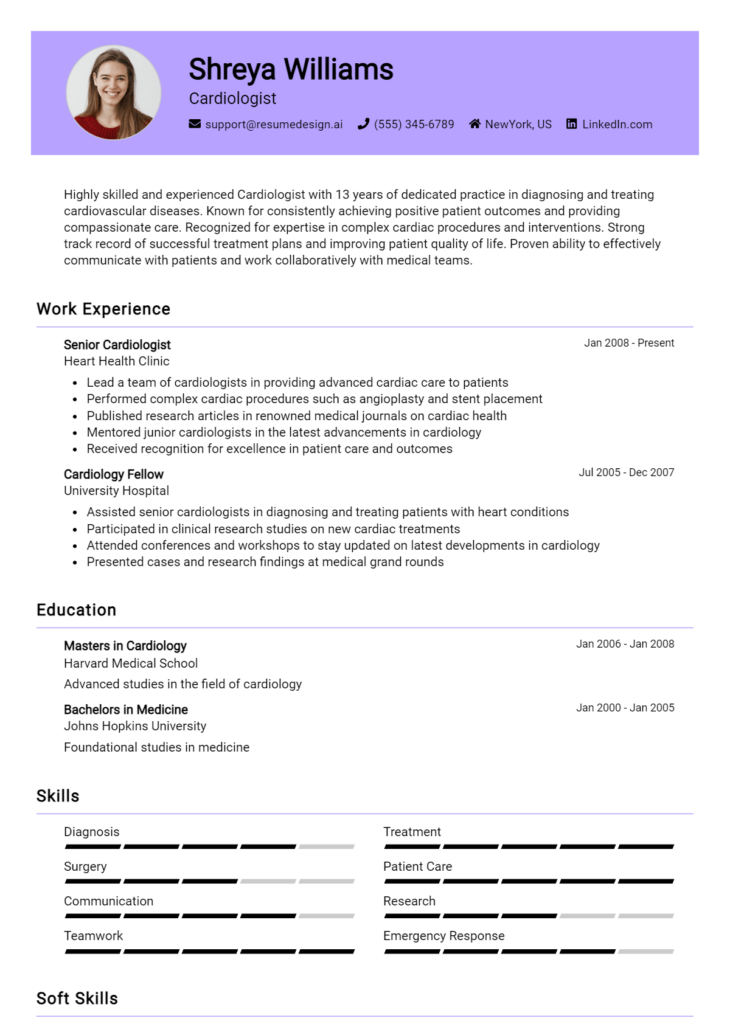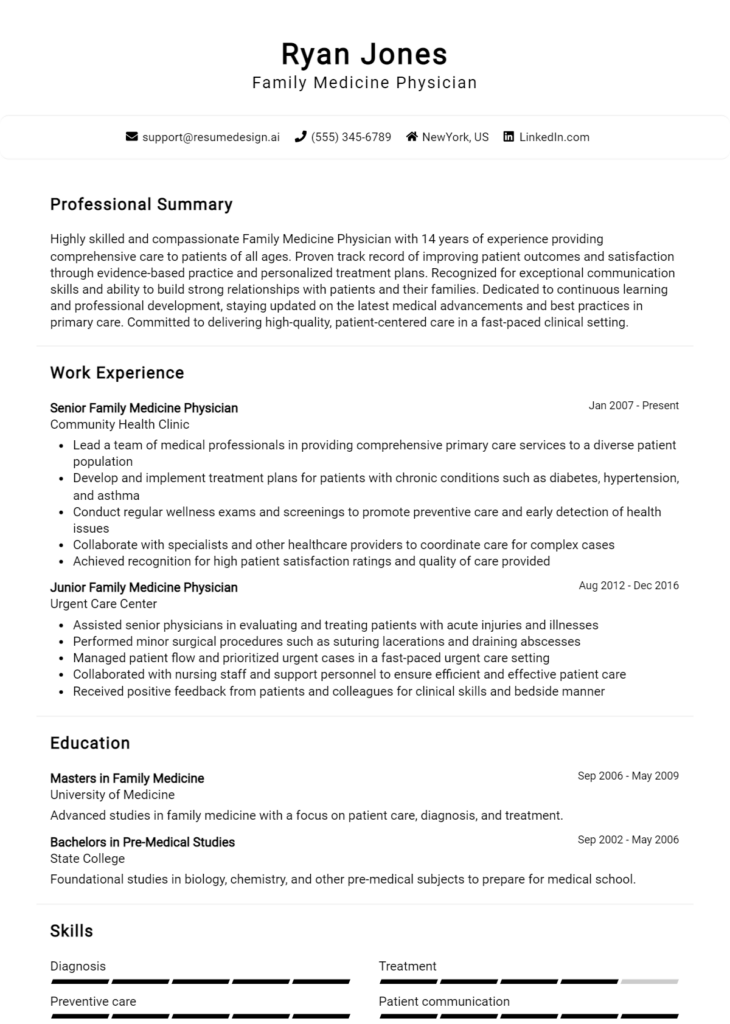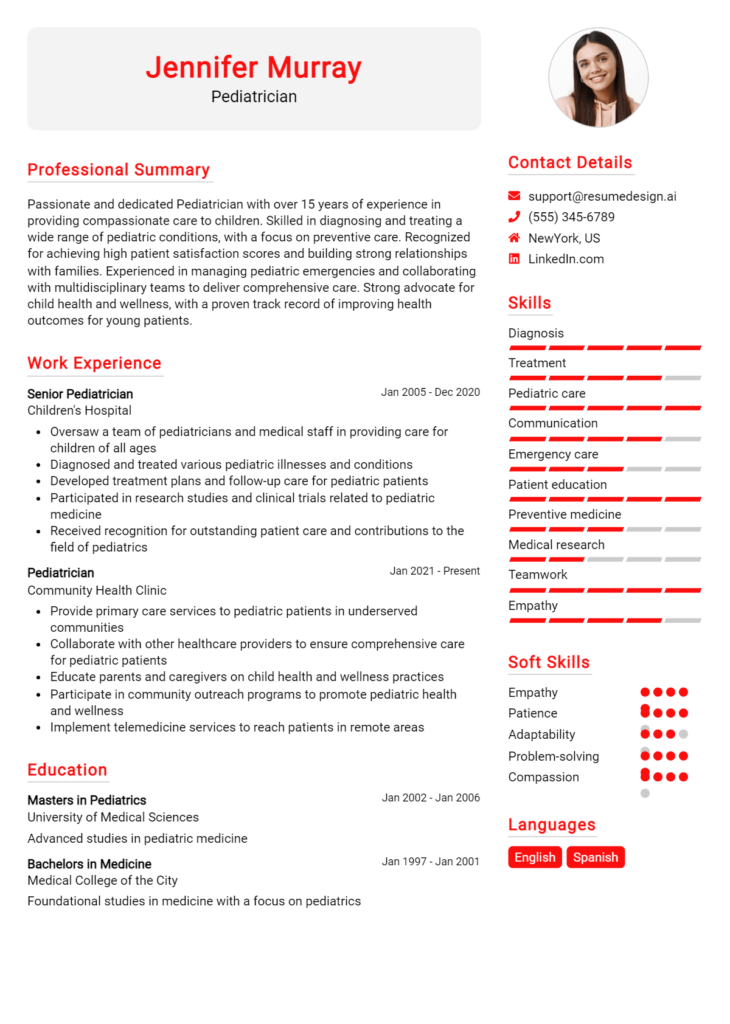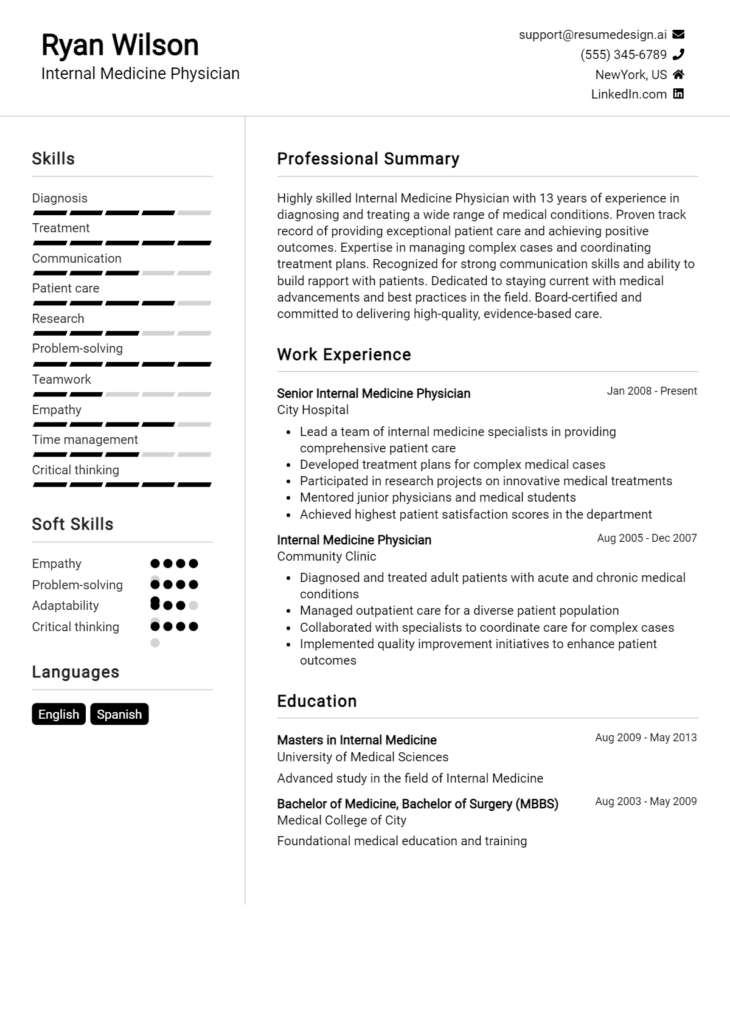General Practitioner Core Responsibilities
A General Practitioner (GP) plays a crucial role in healthcare, serving as the first point of contact for patients. Key responsibilities include diagnosing and treating various medical conditions, coordinating care with specialists, and promoting preventive health measures. Essential skills encompass technical knowledge, operational efficiency, and strong problem-solving abilities, enabling GPs to bridge various healthcare departments effectively. These qualifications contribute significantly to an organization's overall goals, and a well-structured resume can highlight these competencies to attract potential employers.
Common Responsibilities Listed on General Practitioner Resume
- Conducting thorough patient examinations and assessments
- Diagnosing and treating acute and chronic illnesses
- Prescribing medications and developing treatment plans
- Coordinating referrals to specialists when necessary
- Providing preventive care and health education
- Maintaining accurate patient records and documentation
- Staying updated with medical advancements and guidelines
- Managing minor surgeries and procedures in-office
- Engaging in community health initiatives
- Collaborating with healthcare teams to optimize patient care
- Addressing patient concerns and improving health outcomes
- Participating in continuous professional development activities
High-Level Resume Tips for General Practitioner Professionals
In the competitive field of medicine, a well-crafted resume serves as a crucial tool for General Practitioner professionals. It is often the first impression candidates make on potential employers, and thus, it needs to effectively showcase not only their medical skills but also their achievements and dedication to patient care. A strong resume should reflect the unique qualifications that set a candidate apart, demonstrating their capability to thrive in a dynamic healthcare environment. This guide will provide practical and actionable resume tips specifically tailored for General Practitioner professionals, helping you present your best self to prospective employers.
Top Resume Tips for General Practitioner Professionals
- Tailor your resume to the specific job description, emphasizing the skills and experiences that align with the role.
- Highlight relevant clinical experience, including internships, residencies, and fellowships, to demonstrate your background in patient care.
- Quantify your achievements where possible, such as the number of patients treated or improvements in patient outcomes, to illustrate your impact.
- Include industry-specific skills, such as familiarity with electronic health records (EHR) systems, patient management software, and telemedicine platforms.
- Showcase any specialized training or certifications, like Advanced Cardiac Life Support (ACLS) or Pediatric Advanced Life Support (PALS).
- Incorporate strong action verbs to describe your responsibilities and accomplishments, making your contributions more compelling.
- Maintain a clean and professional layout, ensuring that your resume is easy to read and visually appealing.
- Keep your resume concise, ideally one to two pages, focusing on the most relevant information to make a strong impact.
- Include a professional summary at the top that encapsulates your skills, experience, and career goals in a few sentences.
- Don’t forget to proofread for spelling and grammatical errors; a polished resume reflects attention to detail, a critical trait in healthcare.
By implementing these tips, General Practitioner professionals can significantly increase their chances of landing a job in the competitive healthcare landscape. A focused and polished resume will not only highlight your qualifications but also reinforce your commitment to providing exceptional patient care, making a lasting impression on potential employers.
Why Resume Headlines & Titles are Important for General Practitioner
In the competitive field of healthcare, a General Practitioner (GP) must stand out among numerous applicants vying for the same position. A well-crafted resume headline or title plays a crucial role in achieving this goal, as it serves as the first impression hiring managers will have of a candidate. A strong headline can immediately grab the attention of these decision-makers and succinctly summarize a candidate's key qualifications in one impactful phrase. It should be concise, relevant, and directly related to the job being applied for, ensuring that it resonates with the specific needs of the employer and highlights the GP's unique strengths.
Best Practices for Crafting Resume Headlines for General Practitioner
- Keep it concise: Aim for a headline that is clear and to the point, ideally under 10 words.
- Be role-specific: Tailor the headline to reflect the specific position of General Practitioner.
- Highlight key qualifications: Include essential skills or experiences that demonstrate your value as a GP.
- Use impactful language: Choose strong action verbs and descriptive adjectives to convey expertise.
- Incorporate relevant keywords: Use industry-specific terms that are likely to resonate with hiring managers.
- Avoid jargon: Use clear language that is easily understood by all readers, not just healthcare professionals.
- Showcase achievements: If possible, mention specific accomplishments that highlight your effectiveness as a practitioner.
- Reflect your personality: Let your headline convey a sense of your professional identity and approach to patient care.
Example Resume Headlines for General Practitioner
Strong Resume Headlines
Compassionate and Experienced Family Physician Committed to Patient-Centered Care
Board-Certified General Practitioner with 10+ Years in Diverse Clinical Settings
Dedicated General Practitioner Specializing in Preventive Medicine and Community Health
Weak Resume Headlines
General Practitioner Seeking Job
Healthcare Professional Looking for Opportunities
The strong headlines are effective because they provide a clear, concise summary of the candidate's expertise and commitment to patient care, making them immediately appealing to hiring managers. They highlight specific qualifications and showcase the candidate's dedication to the profession. In contrast, the weak headlines fail to impress due to their vagueness and lack of specificity, leaving hiring managers with little to no understanding of the applicant's unique skills or strengths. This distinction can significantly impact a candidate's chances of being selected for an interview.
Writing an Exceptional General Practitioner Resume Summary
A well-crafted resume summary is essential for General Practitioners as it serves as a powerful introduction that can quickly capture the attention of hiring managers. This concise paragraph showcases the candidate's key skills, relevant experience, and notable accomplishments, allowing them to make a strong first impression. A strong summary not only highlights qualifications but is also tailored to the specific job, demonstrating the candidate’s understanding of the role and their potential fit within the organization. By presenting the most impactful information upfront, a compelling resume summary increases the likelihood of moving forward in the hiring process.
Best Practices for Writing a General Practitioner Resume Summary
- Quantify Achievements: Use numbers and statistics to highlight your impact, such as patient satisfaction rates or the number of patients treated.
- Focus on Skills: Highlight key skills relevant to the General Practitioner role, including diagnostic abilities, patient management, and communication skills.
- Tailor to the Job Description: Customize the summary for each application to reflect the specific requirements and responsibilities mentioned in the job posting.
- Highlight Relevant Experience: Emphasize experience that is directly related to primary care and the specific medical field you are applying for.
- Showcase Certifications: Include any relevant certifications or special training that can set you apart from other candidates.
- Keep it Concise: Aim for a summary that is 3-5 sentences long, focusing on the most important aspects of your career.
- Use Action Words: Start sentences with strong action verbs to convey confidence and proactivity.
- Maintain Professional Tone: Keep the language formal and professional, reflecting the seriousness of the healthcare profession.
Example General Practitioner Resume Summaries
Strong Resume Summaries
Compassionate General Practitioner with over 10 years of experience in family medicine, successfully managing a patient base of over 3,000 individuals. Proven track record of improving patient health outcomes by 25% through comprehensive care plans and community health initiatives.
Dedicated General Practitioner skilled in pediatrics and preventive care, recognized for enhancing patient satisfaction ratings to 95% through effective communication and empathetic patient interactions. Board-certified with a commitment to ongoing medical education.
Results-driven General Practitioner with expertise in chronic disease management and acute care. Achieved a 30% reduction in hospital readmission rates among patients by implementing tailored follow-up systems and patient education programs.
Weak Resume Summaries
General Practitioner with experience in various medical fields. Looking to work in a new clinic.
Compassionate physician with a commitment to patient care. Seeking opportunities to improve health outcomes.
The examples of strong resume summaries are effective because they provide specific achievements, quantify results, and emphasize relevant skills and experiences directly related to the General Practitioner role. In contrast, the weak summaries lack detail and specificity, making them too generic and failing to capture the candidate's true potential or contributions to patient care.
Work Experience Section for General Practitioner Resume
The work experience section of a General Practitioner resume is a critical component that highlights the candidate's practical skills and expertise in the medical field. It not only showcases their technical abilities in patient diagnosis and treatment, but also reflects their capacity to manage healthcare teams and deliver high-quality care. By quantifying achievements, such as patient outcomes or efficiency improvements, candidates can demonstrate their impact on healthcare delivery. Aligning this experience with industry standards is essential, as it allows prospective employers to see how a candidate's background meets the specific needs of their organization.
Best Practices for General Practitioner Work Experience
- Use clear and specific language to describe your roles and responsibilities.
- Quantify achievements with data, such as the number of patients treated or improvement in patient satisfaction scores.
- Highlight technical skills relevant to the position, including specific procedures and technologies used.
- Emphasize collaborative efforts with healthcare teams and interdisciplinary coordination.
- Include any leadership roles or initiatives that demonstrate your ability to guide others.
- Tailor your experience to align with the job description and industry standards.
- Showcase continuous professional development through training or certifications.
- Maintain a chronological format to illustrate career progression effectively.
Example Work Experiences for General Practitioner
Strong Experiences
- Successfully managed a patient caseload of over 30 individuals daily, achieving a 95% patient satisfaction rate as measured by post-visit surveys.
- Led a team of 5 nurses and administrative staff in implementing a new electronic health record system, resulting in a 40% reduction in patient wait times.
- Coordinated community health initiatives that increased vaccination rates by 25% over one year, enhancing public health outcomes.
- Conducted over 200 comprehensive health assessments per year, identifying critical health issues and referring patients to specialists, which improved overall patient health management.
Weak Experiences
- Worked as a doctor in a clinic and treated patients.
- Assisted in various medical procedures and helped with patient care.
- Participated in meetings and discussions with staff.
- Engaged in routine check-ups and provided general advice to patients.
The examples highlighted as strong experiences are considered effective because they provide specific, quantifiable outcomes that demonstrate the candidate's impact on patient care and team performance. They illustrate leadership, technical expertise, and collaboration in a clear and compelling manner. In contrast, the weak experiences lack detail and fail to convey significant contributions, making it difficult for employers to gauge the candidate's qualifications and effectiveness in a General Practitioner role.
Education and Certifications Section for General Practitioner Resume
The education and certifications section of a General Practitioner resume is crucial in establishing a candidate's academic foundation and professional qualifications. This section not only showcases the candidate's relevant degrees and certifications but also emphasizes their commitment to continuous learning and staying current in the medical field. By detailing pertinent coursework and any specialized training, candidates can enhance their credibility and demonstrate their alignment with the requirements of the job role, making them more appealing to potential employers.
Best Practices for General Practitioner Education and Certifications
- List degrees in reverse chronological order, starting with the most recent.
- Include relevant certifications that are up-to-date and recognized in the industry.
- Highlight any specialized training or fellowships that pertain to the role of a General Practitioner.
- Be specific about coursework that directly relates to primary care or specialty fields.
- Consider including continuing medical education (CME) credits to demonstrate ongoing learning.
- Make sure to mention any board certifications relevant to general practice.
- Use clear and concise language to ensure the information is easily digestible.
- Focus on achievements or honors received during education, such as scholarships or awards.
Example Education and Certifications for General Practitioner
Strong Examples
- Doctor of Medicine (MD), Harvard Medical School, 2018
- Board Certified in Family Medicine, American Board of Family Medicine, 2019
- Completed Residency in Family Medicine, Johns Hopkins Hospital, 2021
- Advanced Cardiovascular Life Support (ACLS) Certification, 2022
Weak Examples
- Bachelor of Arts in Psychology, University of California, 2012 (not directly relevant)
- Certification in Medical Billing and Coding, 2020 (not pertinent for a practicing GP)
- CPR Certification (Expired, 2018)
- High School Diploma, Local High School, 2010 (not necessary for professional roles)
The strong examples are considered effective because they directly relate to the qualifications needed for a General Practitioner, showcasing advanced degrees, relevant board certifications, and specialized training that align with industry standards. In contrast, the weak examples demonstrate a lack of relevance to the role, featuring outdated or non-industry-specific credentials that do not support the candidate's qualifications as a practicing physician.
Top Skills & Keywords for General Practitioner Resume
As a General Practitioner (GP), having a robust set of skills is crucial for delivering high-quality patient care and ensuring efficient practice management. A well-crafted resume that highlights both hard and soft skills can set a candidate apart in a competitive job market. Skills not only demonstrate a GP's qualifications but also reflect their ability to communicate effectively, empathize with patients, and navigate complex medical scenarios. Therefore, it is essential to tailor your resume with relevant skills to showcase your expertise and align with the expectations of potential employers.
Top Hard & Soft Skills for General Practitioner
Soft Skills
- Empathy
- Communication Skills
- Active Listening
- Problem-Solving
- Time Management
- Interpersonal Skills
- Adaptability
- Teamwork
- Resilience
- Cultural Competency
- Attention to Detail
- Patient Advocacy
- Conflict Resolution
- Professionalism
Hard Skills
- Clinical Diagnosis
- Patient Assessment
- Medical Knowledge
- Emergency Care
- Treatment Planning
- Prescription Management
- Preventive Medicine
- Electronic Health Records (EHR) Proficiency
- Laboratory Interpretation
- Health Education
- Knowledge of Medical Laws and Ethics
- Surgical Skills
- Chronic Disease Management
- Vaccination Administration
For a comprehensive overview of how to effectively showcase your skills, be sure to check out these resources on skills and work experience.
Stand Out with a Winning General Practitioner Cover Letter
Dear Hiring Manager,
I am writing to express my interest in the General Practitioner position at [Clinic/Hospital Name], as advertised on [Job Board/Website]. With a robust background in family medicine and a commitment to providing comprehensive care, I am excited about the opportunity to contribute to your esteemed team. My experience in diagnosing and managing a wide variety of medical conditions, coupled with my empathetic approach to patient care, has equipped me with the skills necessary to excel in this role.
During my [X years] of practice, I have developed a holistic approach to patient care, emphasizing the importance of preventive medicine and patient education. At [Previous Clinic/Hospital Name], I successfully managed a diverse patient demographic, ensuring personalized care plans that resonate with each individual’s unique circumstances. My proficiency in utilizing electronic health records has streamlined patient interactions and improved treatment outcomes, allowing for more efficient care delivery. I am particularly drawn to [Clinic/Hospital Name] because of your commitment to community health and preventive care, and I am eager to bring my expertise to further these initiatives.
I pride myself on my communication skills, ensuring that patients feel heard and understood. I believe that fostering a strong patient-provider relationship is vital for effective treatment and patient satisfaction. I am dedicated to staying current with the latest medical advancements and best practices, having completed [Relevant Certifications or Training] which I believe would be an asset to your team. I am enthusiastic about the possibility of working alongside dedicated professionals who share my passion for improving patient health outcomes.
Thank you for considering my application. I am looking forward to the opportunity to discuss how my background, skills, and enthusiasms align with the goals of [Clinic/Hospital Name]. I am eager to contribute to your mission of providing exemplary healthcare to the community and am excited about the possibility of being a part of your team.
Sincerely,
[Your Name]
[Your Contact Information]
[Your LinkedIn Profile or Professional Website]
Common Mistakes to Avoid in a General Practitioner Resume
When crafting a resume for a General Practitioner position, it's crucial to present your qualifications and experiences in a clear and compelling manner. However, many applicants fall into common pitfalls that can undermine their chances of landing an interview. By being aware of these mistakes, you can enhance your resume and ensure that it effectively showcases your skills and background in the medical field.
Neglecting to Tailor the Resume: Failing to customize your resume for each specific job application can make it seem generic. Tailoring your resume allows you to highlight the most relevant experience and skills for the position.
Using Medical Jargon Excessively: While medical terminology is important, using too much jargon can alienate hiring managers who may not have a clinical background. Aim for a balance that showcases your expertise while remaining accessible.
Overloading with Irrelevant Information: Including unrelated work experience or excessive detail about non-medical roles can detract from your qualifications. Focus on experiences that are pertinent to the position of General Practitioner.
Ignoring Soft Skills: While clinical skills are paramount, neglecting to mention soft skills such as communication, empathy, and teamwork can be a mistake. These attributes are essential for patient care and collaboration with colleagues.
Inadequate Formatting: A cluttered or poorly organized resume can hinder readability. Use clear headings, bullet points, and consistent formatting to guide the reader and make your qualifications stand out.
Omitting Key Certifications and Licenses: Failing to list important certifications, licenses, or continuing education can lead to missed opportunities. Ensure that all relevant qualifications are prominently displayed.
Using Passive Language: Using passive voice can make your accomplishments sound less impactful. Opt for active language that conveys confidence and assertiveness in your achievements.
Not Proofreading: Spelling and grammatical errors can create a negative impression. Always proofread your resume multiple times or ask someone else to review it to catch any mistakes before submission.
Conclusion
As a General Practitioner, your resume plays a crucial role in showcasing your skills, experience, and qualifications to potential employers. In this article, we have highlighted the essential components of an effective GP resume, including the importance of tailoring your resume to the specific job you are applying for, emphasizing relevant clinical experience, and showcasing your interpersonal skills that are vital in patient care.
We also discussed the significance of including certifications, continuing education, and any specializations that set you apart from other candidates. Remember, your resume is not just a list of qualifications; it should tell a story about your professional journey and your commitment to patient health and well-being.
To ensure your resume stands out in a competitive job market, we encourage you to take the time to review and refine it. Utilize the available resources to enhance your application materials. Check out resume templates to find a professional layout that suits your style, use the resume builder for a guided approach in crafting your resume, explore resume examples for inspiration from other successful GPs, and don’t forget to create a compelling cover letter using our cover letter templates.
Take action today and make sure your resume reflects the exceptional qualities and experiences that you bring to the field of general practice!

